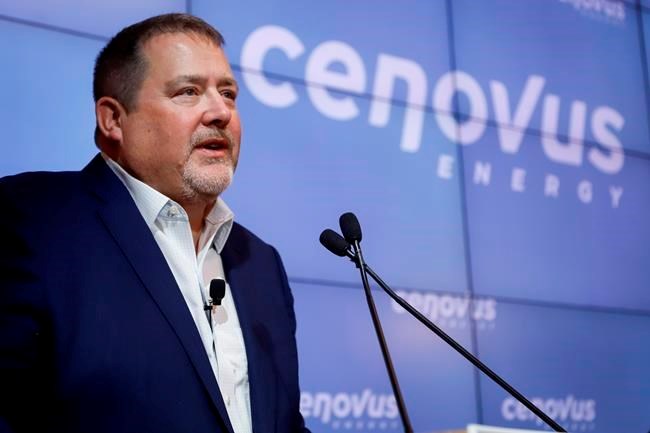CALGARY — Cenovus Energy Inc. says Ottawa's forthcoming release of details about its proposed tax credit for carbon capture, utilization and storage projects (CCUS) should be followed by "significant government support" so the industry can widely adopt the technology.
The Calgary-based oil producer has been involved in ongoing discussions with Ottawa over the tax credit, which was announced in this year's federal budget. On Wednesday, Rhona DelFrari, the company's chief sustainability officer, said the talks have been going well.
"Everyone is in a very collaborative mood," DelFrari told reporters following Cenovus' annual investor day event. "We continue to have a lot of ongoing dialogue with them as the government works toward its investment tax credit that they intend to provide more detail about soon."
CCUS is a technology that captures greenhouse gas emissions from industrial sources and stores them deep in the ground to prevent them from being released into the atmosphere.
Proponents say vastly scaling up CCUS across the oil and gas industry will be necessary if Canada is to have a shot at meeting its climate targets. However, some environmentalists are critical of the technology that does nothing to curb overall production of fossil fuel products.
In its five-year plan released Wednesday, Cenovus includes smaller, near-term CCUS projects in the works at its Lloydminster Upgrader, Minnedosa Ethanol Plant, and Elmworth gas plant.
Longer-term, Cenovus is part of the Oil Sands Pathways to Net Zero Alliance, a group of Canadian oilsands producers whose vision of getting the industry to net zero greenhouse gas emissions by 2050 is anchored by a proposed major CCUS transportation line that would capture CO2 from oilsands facilities and transport it to a storage facility near Cold Lake, Alta.
Cenovus itself has set a target to reduce emissions by 35 per cent by 2035 from 2019 levels.
However, Cenovus chief executive Alex Pourbaix said he reminds people all the time that CCUS technology is still in its infancy.
"Right now, on its own, CCUS is not an economic technology on its own. It is a pretty significant incremental cost to any energy producer," Pourbaix said.
"Anywhere you have seen CCUS undertaken at scale, it is almost inevitably undertaken with significant government collaboration and support."
Cenovus declined to see what specifically the company wants to see in a CCUS tax credit, but DelFrari said that projects in other parts of the world that have been successful have been anywhere from two-thirds to three-quarters supported by government.
The company has also been encouraging Ottawa to make enhanced oil recovery projects eligible for the tax credit, something the government had originally ruled out. Enhanced oil recovery, or EOR, is a process that can significantly enhance a site's oil production through the process of injecting carbon dioxide underground to extract additional oil from older wells.
"We would be very big proponents and would encourage the government, as these consultations around the investor tax credit go on, to really consider having an open mind about the inclusion of EOR," Pourbaix said.
Cenovus announced a capital spending budget Wednesday between $2.6 billion and $3 billion for next year, up from its guidance for between $2.3 billion and $2.7 billion this year.
The company also said it plans to allocate about 50 per cent of its excess cash flow in 2022 to shareholder returns. Remaining excess cash flow will be put toward the goal of reducing the company's net debt to below $8 billion.
Cenovus said capital spending on its upstream assets next year is expected to be between $1.7 billion and $2 billion, including $1.35 billion to $1.55 billion for its oilsands operations.
Downstream capital investments in 2022 are expected to total between $850 million and $950 million, including $200 million to $250 million for its Superior Refinery rebuild project, which Cenovus expects will be largely offset by insurance.
In its guidance for 2022, the company says it expects total production of between 780,000 and 820,000 barrels of oil equivalent per day and downstream throughput between 530,000 and 580,000 barrels per day.
Cenovus said its capital programs and current base dividend are sustainable at a West Texas Intermediate crude price of US$45 per barrel. WTI closed at US$72.05 on Tuesday.
This report by The Canadian Press was first published Dec. 8, 2021.
Companies in this story: (TSX:CVE)
Amanda Stephenson, The Canadian Press




